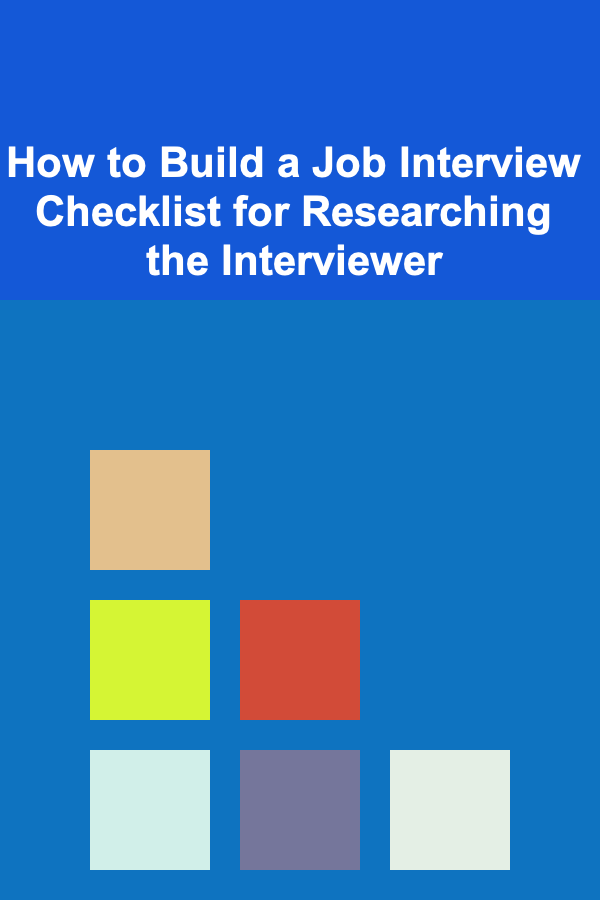
How to Build a Job Interview Checklist for Researching the Interviewer
ebook include PDF & Audio bundle (Micro Guide)
$12.99$5.99
Limited Time Offer! Order within the next:

One of the most important steps in preparing for a job interview is understanding the person you'll be speaking with---the interviewer. Knowing about your interviewer can help you build rapport, answer questions more effectively, and ask insightful questions that show your interest in the position and company. But how do you go about researching the interviewer, and what should you look for?
This guide will take you step by step through the process of creating an actionable job interview checklist for researching the interviewer, ensuring that you walk into the interview feeling confident, well-prepared, and knowledgeable.
Why Researching the Interviewer is Crucial
Understanding your interviewer is just as important as understanding the company and the job role itself. When you know more about the person interviewing you, you can:
- Personalize Your Responses: Tailor your answers based on the interviewer's background and professional experiences.
- Build Rapport: Finding common ground can help ease the tension and create a more conversational atmosphere.
- Prepare Insightful Questions: By knowing the interviewer's role, interests, or expertise, you can ask thoughtful, targeted questions that show you've done your homework.
- Demonstrate Cultural Fit: Understanding the interviewer's values and priorities can help you frame your answers in a way that aligns with the company culture.
Now, let's break down the process of researching your interviewer into a checklist.
Start with Basic Information
1.1. Name and Position
The first step in preparing for the interview is simply knowing who you'll be meeting. Look up the interviewer's full name and their current job title. Make sure you understand their position within the organization and what it entails. This is essential for tailoring your responses to demonstrate that you understand the interviewer's responsibilities.
- Action Item: Make sure you know the full name and official job title of your interviewer before the interview.
1.2. Company and Department
Research the department the interviewer works in, and how their department aligns with the role you're applying for. Does the interviewer work in HR, operations, product development, or marketing? Knowing the department can help you understand their perspective and what they may focus on during the interview.
- Action Item: Identify the department your interviewer works in and their relationship to the position you're applying for.
Look for Professional Background
2.1. LinkedIn Profile
LinkedIn is an excellent tool for finding detailed professional backgrounds. Take a deep dive into your interviewer's LinkedIn profile to learn about their career trajectory, professional experience, and any shared connections or interests.
Look for:
- Previous Job Roles: Understand where they've worked and what roles they've held. This could provide insight into what they value or expect in an employee.
- Education: Knowing where they went to school and their academic background can give you common ground or show you a shared interest.
- Skills and Endorsements: Look at what skills they're most endorsed for and whether those skills relate to the job you're interviewing for.
- Action Item: Review your interviewer's LinkedIn profile and make note of their career trajectory, key skills, and educational background.
2.2. Professional Achievements and Publications
If your interviewer has written articles, blog posts, or papers, or if they've been featured in interviews or industry panels, take note of these. Understanding their professional achievements can give you valuable insight into their expertise and what they prioritize.
- Action Item: Search for any articles, blog posts, or interviews your interviewer may have been involved in, and familiarize yourself with their areas of expertise.
2.3. Social Media
If appropriate and accessible, consider researching other social media platforms where your interviewer might have an online presence, such as Twitter or personal blogs. Sometimes interviewers share opinions, industry insights, or personal anecdotes that might help you connect with them on a more personal level during the interview.
- Action Item: Research your interviewer's social media presence, but be mindful of professionalism. Avoid getting too personal or reading too much into casual posts.
Understand the Interviewer's Work Style and Personality
3.1. Past Interview Experiences
If possible, look for reviews of your interviewer on platforms like Glassdoor, Indeed, or other job forums. Some candidates may share their experiences about the interview process, including the interviewer's style---whether they are formal or informal, how they ask questions, and what they focus on.
- Action Item: Search for any reviews or feedback from past candidates who were interviewed by your interviewer or worked with them.
3.2. Behavioral Cues
Based on your research, try to determine the type of interview your interviewer is likely to conduct. Are they likely to ask competency-based questions, or will they focus on technical knowledge? Understanding their approach can help you prepare more effectively. For instance, if they have a background in HR or recruitment, they may lean more toward behavioral questions to assess cultural fit.
- Action Item: Assess the interviewer's potential interview style based on their background and past interviews. Tailor your preparation accordingly.
Understand the Company Culture and Values
4.1. Company Website
Researching the company's mission, vision, and values is essential for understanding the broader context in which the interviewer operates. The interviewer may expect you to show that you align with these values, or they may focus on how you'll fit into the company culture. Look for mission statements, company blogs, and the careers page to understand what the company prioritizes.
- Action Item: Review the company website, paying close attention to the mission, vision, and values sections.
4.2. Company News
Look for recent news about the company or press releases. If the company has recently made headlines for a new product launch, acquisition, or community initiative, this can be an excellent conversation starter and demonstrates that you're well-informed.
- Action Item: Check for recent news stories, product launches, or other significant developments within the company.
4.3. Company Reviews
Platforms like Glassdoor and Indeed can give you insights into the employee experience at the company. While reviews can vary, they often reveal insights into the company's culture, work-life balance, leadership style, and even management's values.
- Action Item: Look for company reviews and focus on feedback that pertains to company culture and leadership. Compare this with your interviewer's background to see if there are any similarities in leadership styles.
Prepare Thoughtful Questions for the Interviewer
A well-researched interviewer will also allow you to ask insightful, personalized questions during the interview. It's important to ask questions that reflect your understanding of the interviewer's role and the company.
Here are a few examples of questions you can ask based on your research:
- About their role: "I noticed that you have a background in [X]. How has that influenced your approach to managing your team?"
- Company growth: "I read that the company is expanding into new markets. How does the department I'm applying to contribute to that growth?"
- Challenges: "Given your experience in [X], what challenges do you foresee in this role that someone new should be aware of?"
- Action Item: Prepare thoughtful questions based on the interviewer's background, their department, and recent company developments.
Conclusion
Researching your interviewer before a job interview is an essential step to ensure that you enter the conversation prepared, confident, and able to build rapport. By following this checklist, you'll be able to personalize your responses, ask insightful questions, and make a lasting impression. Remember, the goal of your research is not only to gather facts but also to understand your interviewer's perspective and build a genuine connection during your interview.

How to Build Wealth Early in Your Career for Long-Term Success
Read More
How to Keep Your Home Organized and Maximize Space at the Same Time
Read More
Top Public Transportation Alternatives for Reducing Your Carbon Footprint
Read More
Cooking Healthy Meals for Weight Loss: A Comprehensive Guide
Read More
Analyzing the Appeal of Being an "Insider" in Conspiracy Theories
Read More
How to Choose a Credit Card Based on Your Spending Habits
Read MoreOther Products

How to Build Wealth Early in Your Career for Long-Term Success
Read More
How to Keep Your Home Organized and Maximize Space at the Same Time
Read More
Top Public Transportation Alternatives for Reducing Your Carbon Footprint
Read More
Cooking Healthy Meals for Weight Loss: A Comprehensive Guide
Read More
Analyzing the Appeal of Being an "Insider" in Conspiracy Theories
Read More